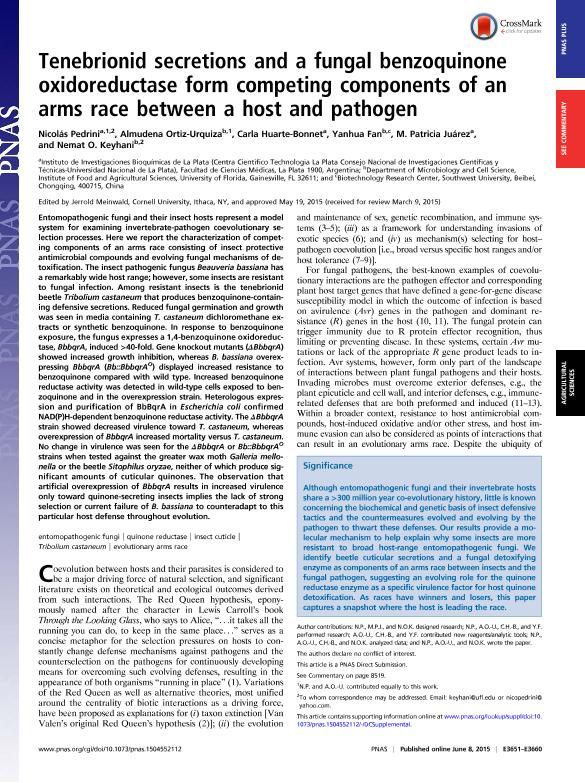Mostrar el registro sencillo del ítem
dc.contributor.author
Pedrini, Nicolás

dc.contributor.author
Ortiz Urquiza, Almudena
dc.contributor.author
Huarte Bonnet, Carla

dc.contributor.author
Fan, Yanhua
dc.contributor.author
Juarez, Marta Patricia

dc.contributor.author
Keyhani, Nemat O
dc.date.available
2018-06-15T14:58:21Z
dc.date.issued
2015-06
dc.identifier.citation
Pedrini, Nicolás; Ortiz Urquiza, Almudena; Huarte Bonnet, Carla; Fan, Yanhua; Juarez, Marta Patricia; et al.; Tenebrionid secretions and a fungal benzoquinone oxidoreductase form competing components of an arms race between a host and pathogen; National Academy of Sciences; Proceedings of the National Academy of Sciences of The United States of America; 112; 28; 6-2015; 3651-3660
dc.identifier.issn
0027-8424
dc.identifier.uri
http://hdl.handle.net/11336/48772
dc.description.abstract
Entomopathogenic fungi and their insect hosts represent a model system for examining invertebrate-pathogen coevolutionary selection processes. Here we report the characterization of competing components of an arms race consisting of insect protective antimicrobial compounds and evolving fungal mechanisms of detoxification. The insect pathogenic fungus Beauveria bassiana has a remarkably wide host range; however, some insects are resistant to fungal infection. Among resistant insects is the tenebrionid beetle Tribolium castaneum that produces benzoquinone-containing defensive secretions. Reduced fungal germination and growth was seen in media containing T. castaneum dichloromethane extracts or synthetic benzoquinone. In response to benzoquinone exposure, the fungus expresses a 1,4-benzoquinone oxidoreductase, BbbqrA, induced >40-fold. Gene knockout mutants (ΔBbbqrA) showed increased growth inhibition, whereas B. bassiana overexpressing BbbqrA (Bb::BbbqrAO) displayed increased resistance to benzoquinone compared with wild type. Increased benzoquinone reductase activity was detected in wild-type cells exposed to benzoquinone and in the overexpression strain. Heterologous expression and purification of BbBqrA in Escherichia coli confirmed NAD(P)H-dependent benzoquinone reductase activity. The ΔBbbqrA strain showed decreased virulence toward T. castaneum, whereas overexpression of BbbqrA increased mortality versus T. castaneum. No change in virulence was seen for the ΔBbbqrA or Bb::BbbqrAO strains when tested against the greater wax moth Galleria mellonella or the beetle Sitophilus oryzae, neither of which produce significant amounts of cuticular quinones. The observation that artificial overexpression of BbbqrA results in increased virulence only toward quinone-secreting insects implies the lack of strong selection or current failure of B. bassiana to counteradapt to this particular host defense throughout evolution.
dc.format
application/pdf
dc.language.iso
eng
dc.publisher
National Academy of Sciences

dc.rights
info:eu-repo/semantics/openAccess
dc.rights.uri
https://creativecommons.org/licenses/by-nc-sa/2.5/ar/
dc.subject
Entomopathogenic Fungi
dc.subject
Quinone Reductase
dc.subject
Insect Cuticle
dc.subject
Tribolium Castaneum
dc.subject
Evolucionary Arm Race
dc.subject.classification
Otras Ciencias Biológicas

dc.subject.classification
Ciencias Biológicas

dc.subject.classification
CIENCIAS NATURALES Y EXACTAS

dc.title
Tenebrionid secretions and a fungal benzoquinone oxidoreductase form competing components of an arms race between a host and pathogen
dc.type
info:eu-repo/semantics/article
dc.type
info:ar-repo/semantics/artículo
dc.type
info:eu-repo/semantics/publishedVersion
dc.date.updated
2018-06-14T19:04:11Z
dc.journal.volume
112
dc.journal.number
28
dc.journal.pagination
3651-3660
dc.journal.pais
Estados Unidos

dc.journal.ciudad
Washington
dc.description.fil
Fil: Pedrini, Nicolás. Consejo Nacional de Investigaciones Científicas y Técnicas. Centro Científico Tecnológico Conicet - La Plata. Instituto de Investigaciones Bioquímicas de La Plata "Prof. Dr. Rodolfo R. Brenner". Universidad Nacional de la Plata. Facultad de Ciencias Médicas. Instituto de Investigaciones Bioquímicas de La Plata ; Argentina
dc.description.fil
Fil: Ortiz Urquiza, Almudena. University of Florida; Estados Unidos
dc.description.fil
Fil: Huarte Bonnet, Carla. Consejo Nacional de Investigaciones Científicas y Técnicas. Centro Científico Tecnológico Conicet - La Plata. Instituto de Investigaciones Bioquímicas de La Plata "Prof. Dr. Rodolfo R. Brenner". Universidad Nacional de la Plata. Facultad de Ciencias Médicas. Instituto de Investigaciones Bioquímicas de La Plata ; Argentina
dc.description.fil
Fil: Fan, Yanhua. University of Florida; Estados Unidos. Southwest University; Estados Unidos
dc.description.fil
Fil: Juarez, Marta Patricia. Consejo Nacional de Investigaciones Científicas y Técnicas. Centro Científico Tecnológico Conicet - La Plata. Instituto de Investigaciones Bioquímicas de La Plata "Prof. Dr. Rodolfo R. Brenner". Universidad Nacional de la Plata. Facultad de Ciencias Médicas. Instituto de Investigaciones Bioquímicas de La Plata ; Argentina
dc.description.fil
Fil: Keyhani, Nemat O. University of Florida; Estados Unidos
dc.journal.title
Proceedings of the National Academy of Sciences of The United States of America

dc.relation.alternativeid
info:eu-repo/semantics/altIdentifier/doi/https://dx.doi.org/10.1073/pnas.1504552112
dc.relation.alternativeid
info:eu-repo/semantics/altIdentifier/url/http://www.pnas.org/content/112/28/E3651
Archivos asociados
